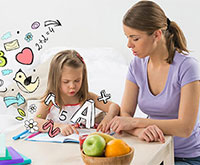Some studies report that parenting children makes people happier and increases wellness, while other studies report the exact opposite. Researchers wanted to figure out why this discrepancy exists and in doing so uncovered how our personal parenting style may be at the root of it. Researchers found that certain parents have a more intense approach, which causes them to feel lower life satisfaction and higher rates of depression and stress. They coined this approach “intensive parenting”.
Researchers found that in their study, “intensive parenting” was exclusively the domain of mothers and not fathers. There may be some fathers who also follow that approach but the researchers just didn’t come across any.
The researchers asked questions structured around 5 categories to determine if a person’s style fell into “intensive parenting”. The five categories are:
1. Essentialism – The perception that mothers are more “necessary and capable” than fathers. (For this category, one question was “Do you think moms are ultimately more important than dads?” The possible answers were “1. Yes, they’re more natural parents. 2. No way, dads are crucial. 3. Perhaps, depending on the individual.)
2. Fulfillment – The belief that a parent’s happiness is derived primarily from their children.
3. Stimulation – The idea that the parent should always provide the best and/or intellectually stimulating activities to further their child’s development.
4. Challenging – The perception that parenting is exhausting, challenging and just about the hardest job there is. (For this category, participants in the study ranked statements like “It is harder to be a good mother than to be a corporate executive.”)
5. Child-centered – The idea that children’s needs and wants should always come before the parents.
Researchers found that out of the 5 categories listed above, categories 1, 4, and 5 contributed the most to depressive, stressed, and decreased life satisfaction rates. The findings are broken down below, starting with the most affected categories to the least affected:
-Parents who scored high on the “challenging” (#4) category were more depressed, stressed, and less satisfied with their lives.
-Parents who scored high on “essentialism” (#1) were more stressed and less satisfied with their lives, but not more depressed. This may suggest that feeling essential could be a buffer against feeling depressed.
-Parents who scored high on “child-centered” (#5) were less satisfied with their lives but not more stressed or depressed.
Researchers did not examine the effects upon children who have intense parents but countless studies have demonstrated that having depressed and stressed out parents is maladaptive. Researchers were not clear on what causes certain parents to be “intense parents” but it could be personal beliefs and values.
So, if you feel stressed out, depressed and decreased life satisfaction examine your parenting style and make changes to a more carefree and happier you!

